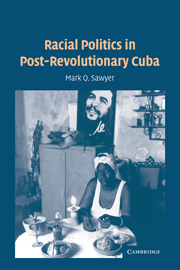Book contents
- Frontmatter
- Contents
- List of Figures and Tables
- Acknowledgments
- Introduction
- 1 Race Cycles, Racial Hierarchy, and Inclusionary Discrimination: A Dynamic Approach
- 2 Freedom and Discrimination: Uneven Inequality and Inclusion in Pre-Revolutionary Cuba
- 3 Race and Revolution: Transformation and Continuity
- 4 Match Made in Heaven or Strange Bedfellows? Black Radicals in Castro's Cuba
- 5 Race and Daily Life in Cuba During the Special Period: Part I: Interview Data
- 6 Race and Daily Life in Cuba During the Special Period: Part Ⅱ: Survey Research
- 7 Racial Politics in Miami: Ninety Miles and a World Away
- Conclusion
- Bibliography
- Index
6 - Race and Daily Life in Cuba During the Special Period: Part Ⅱ: Survey Research
Published online by Cambridge University Press: 05 September 2012
- Frontmatter
- Contents
- List of Figures and Tables
- Acknowledgments
- Introduction
- 1 Race Cycles, Racial Hierarchy, and Inclusionary Discrimination: A Dynamic Approach
- 2 Freedom and Discrimination: Uneven Inequality and Inclusion in Pre-Revolutionary Cuba
- 3 Race and Revolution: Transformation and Continuity
- 4 Match Made in Heaven or Strange Bedfellows? Black Radicals in Castro's Cuba
- 5 Race and Daily Life in Cuba During the Special Period: Part I: Interview Data
- 6 Race and Daily Life in Cuba During the Special Period: Part Ⅱ: Survey Research
- 7 Racial Politics in Miami: Ninety Miles and a World Away
- Conclusion
- Bibliography
- Index
Summary
In the spring of 2000 and the spring of 2001, I had a unique opportunity to conduct surveys regarding racial attitudes in Cuba. While survey research on race has its limits, as discussed in the previous chapter, the surveys I conducted in Havana allowed me to produce statistical measures of the salience of race in Cuba and to investigate to what degree racial politics in Cuba conform with the theories of Marxist and Latin American exceptionalists and Black Nationalists or with the alternative: inclusionary discrimination.
Most important, the surveys enabled me to conduct a broader test of many of the arguments I made in the previous chapter, which were based on in-depth oral interviews with a relatively small sample of Cubans. Using the surveys, I was able to test the following propositions: Racial categories are coherent and salient in Cuba; race affects Afro-Cubans' life chances; the new dollar economy is racially stratified; racism continues to exist among Cuban whites; blacks continue to support the regime because of its past successes and their mistrust of other alternatives; and the economic downturn has exacerbated Cuban racial differences, producing differing perspectives among blacks and whites on the Cuban economy and social life.
If the Marxists and Latin American exceptionalists are correct, there should be few differences of opinion across racial lines, and racism should almost be nonexistent in Cuba today.
- Type
- Chapter
- Information
- Racial Politics in Post-Revolutionary Cuba , pp. 134 - 153Publisher: Cambridge University PressPrint publication year: 2005



